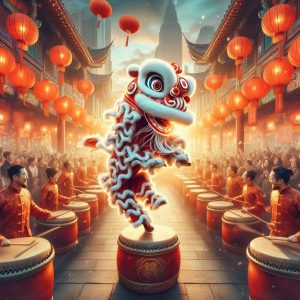Music and the Lion Dance: A Powerful Duo of Rhythm and Culture
 The lion dance is more than just a colorful performance. It is a cultural tradition performed by a lion dance troupe that brings energy, luck, and celebration to events. Whether during Chinese New Year, weddings, or store openings, the lion dance is a familiar sight. But behind every leap and stomp is something that makes the performance come alive—music.
The lion dance is more than just a colorful performance. It is a cultural tradition performed by a lion dance troupe that brings energy, luck, and celebration to events. Whether during Chinese New Year, weddings, or store openings, the lion dance is a familiar sight. But behind every leap and stomp is something that makes the performance come alive—music.
The Role of Music in Lion Dance
Music is the heartbeat of the lion dance. Without it, the performance loses its rhythm and meaning. Traditional lion dance music includes drums, cymbals, and gongs. Each beat signals a move, a pause, or a dramatic jump. The drum sets the pace, while the cymbals and gongs add layers of excitement and sound.
The music is not random. It is carefully timed to match the lion’s movements. A sudden drumroll can mean the lion is about to leap, while a slow beat may show the lion is being cautious. The rhythm tells a story and helps the performers stay in sync. It also draws the audience into the performance.
Cultural Meaning and Connection
The lion dance is rooted in Chinese culture and history. It is believed to scare away evil spirits and bring good fortune. The music adds to this power. Loud, rhythmic sounds are said to drive away bad luck and create a joyful space.
Many modern lion dance troupes still follow the old musical patterns. But some groups add new elements, like electronic beats or modern drums, to make the performance feel fresh. This helps keep younger generations interested while honoring tradition.
Music and Community Engagement
The lion dance brings people together. Whether it’s performed at a school, a festival, or a business opening, the dance and its music catch everyone’s attention. Children often dance along, and adults pause to enjoy the rhythm.
Musicians in a lion dance troupe are just as important as the dancers. They train to master timing and control. In many cases, music schools or cultural groups offer classes that teach both drumming and dance. This helps keep the tradition alive and growing.
In some areas, schools even invite lion dance groups to perform and teach students. This spreads cultural knowledge and builds appreciation through music and performance. It’s a powerful way to mix learning with fun.
